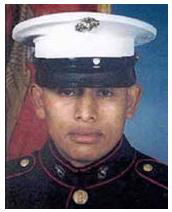 |
 |
 |
 Editorials | At Issue | July 2005 Editorials | At Issue | July 2005  
The Life and Death of an American Dream
 W. E. Gutman - Panama News W. E. Gutman - Panama News


| | Semper Fi: the late Lance Corporal José Antonio Gutiérrez, USMC. |
Long before he shipped out for the Persian Gulf, Marine Lance Corporal Jose Antonio Gutierrez had defied the odds and conquered adversity.

He is fondly remembered as a lanky youth with eyes black as night and a face chiseled by sharp Maya features. He spoke softly, with a precocious wisdom born of misery endured. He dreamed of becoming an architect, an ambition full of symbolism for a homeless child who spent two years surviving on the mean streets of Guatemala's sprawling capital.

Jose Antonio was three when his mother died, eight when his father passed away. He was 22 when he began an all-too-familiar and perilous trek, first across Mexico and then on to the US. He loved America, he had often affirmed, even though he had never been there. It was as if he was grateful - in advance - for the dreams that the hankering inspired. Grateful and beguiled. The seduction would soon prove fatal.

In 1997, Jose Antonio made the 2,000-mile journey north as many of his countrymen do - by any means, first on foot then hitching rides on trucks then hopping as many as 14 trains. We he arrived in California, he slept on park benches and ate meals at a shelter for the homeless. He could have joined a gang or vanished in the anonymity of some obscure, minimum-wage job. Instead, an alert social worker enrolled him in a program that helped him gain legal residency and placed him with Marcelo Mosquera, a Lomita machinist originally from Ecuador, and his wife, Nora, a marketing representative born in Costa Rica.

Jose Antonio attended North High School in Torrance and Harbor College before enlisting in the Marines on March 25th, 2002. Following boot camp, he was assigned to the Second Battalion of the Expeditionary Forces of the US Marine's First Division and was billeted at Camp Pendleton in early September.

Lance Corporal Jose Antonio Gutierrez was killed on March 21, 2003. He was the second casualty in a war that would claim - to date - the lives of nearly 2,000 men and women. According to a military spokesman, "Gutierrez was felled by enemy fire as he fought alongside his fellow Marines near the southern Iraqi city of Umm al Qasr." Authorities would later reveal that he had been killed not by enemy bullets but by friendly fire.

Jose Antonio's remains were flown to Guatemala for interment. Military officials said that he would be buried with full military honors next to his biological parents - a preposterous assertion, as no one knows where his parents are buried.

On March 24, then on April 9, 2003, US Ambassador to Guatemala, John R. Hamilton, issued statements filled with stock phrases of staggering banality, the kind of perfunctory apologia worded to exculpate the generals rather than to mourn the grunt.

Plain-spoken and direct, Bruce Harris, then-regional director of Casa Alianza, the child advocacy organization that shelters and rehabilitates homeless children, said "Jose Antonio, one of our former wards, died in the desert fighting someone else's war." Harris, who knew Jose Antonio personally, lobbied to have him laid to rest at the Ciudad Vieja cemetery, where other street children - most of them murdered by agents of the state - are buried. The US military refused.

"He was hastily buried in one of the fanciest graveyards in Guatemala City," Harris remembers, "in a plot where up to three family members can be stacked on top of each other..."

"We dedicated a green marble plaque at the Ciudad Vieja Casa Alianza cemetery, which was more like home to him and where he would have been surrounded by friends who also died in a war for survival, rather than by people from a social class that spurned him."

It's easy to write off the American dream as hype but people like Jose Antonio, who was granted US citizenship posthumously, prove that it is possible to break the bonds of hopelessness and rise above them. Lance Corporal Jose Antonio Gutierrez showed uncommon valor well before he was hailed as a hero. He wanted "to give the United States what the United States gave me. I came with nothing. This country gave me everything."

In a tragic twist of fate, it also took everything back, including his life.

Willy E. Gutman is a veteran journalist on regular assignment in Central America since 1991. He lives in southern California. | 
 | |
 |



